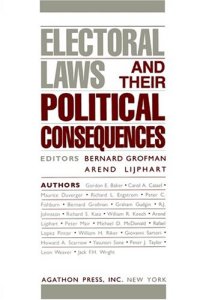
Ebook: Electoral Laws and Their Political Consequences (Agathon Series on Representation) (Agathon Series on Representation)
Author: Arend Lijphart et al.
The aim of this book is to provide an overview of recent research on electoral laws and their political consequences by scholars who have helped shape the field. After several decades of virtual neglect (except for Douglas Rae's seminal work), the comparative study of electoral systems is undergoing a lively revival. In the past five years, over a dozen books on electoral systems have been written by scholars from many nations and from many disciplines (see reviews of a number of these in Lijphart, Political geography, long moribund, is undergoing a remarkable renaissance (see reviews in Grofman, Taylor, Gudgin, and Johnston, this volume). Social choice theorists have begun to link axiomatic criteria for representative systems to practical political issues in choosing an election system (see especially Brams and Fishburn, Fishburn, this volume). In the United States, sparked in large part by the efforts of the section on Representation and Electoral Systems of the American Political Science Association, the history of American electoral experimentation with proportional representation, weighted voting, and limited voting is being rediscovered (see Grofman Weaver, this volume).This renewed scholarly attention to the study of electoral systems is long overdue. The late Stein Rokkan wrote in 1968, "Given the crucial importance of the organization of legitimate elections in the development of the mass democracies of the twentieth century, it is indeed astounding to discover how little serious effort has been invested in the comparative study of the wealth of information available . The long past neglect of electoral systems by social scientists is especially surprising since election rules not only have important effects on other elements of the political system, especially the party system, but also offer a practical instrument for political engineers who want to make changes in the political system. Indeed, Sartori aptly characterizes electoral systems as the most specific manipulative instrument of politics . Part 1. The Effect of Election Type on Political Competition: 1. Duverger's Law Revisited 2. The Influence of Electoral Sysems: Faulty Laws or Faulty Method? 3. Duverger's Law: Forty Years Later 4. Intraparty Preference Voting 5. Thinking About the Length and Renewability of Electoral Terms Part II. Evaluating the Impact of Electoral Laws: Proportional and Semiproportional Systems Case Studies: 6. Proportionality by Non-PR Methods: Ethnic Representation in Belgium, Cyprus, Lebanon, New Zealand, West Germany and Zimbabwe 7. Australian Experience with Majority-Preferential and Quota-Preferential Systems 8. The Rise, Decline and Resurrection of Proportional Representation in Local Governments in the United States 9. The Limited Vote and the Single Nontransferable Vote: Lessons from the Japanese and Spanish Examples 10 Degrees of Proportionality of Proportional Representation Formulas Part III. Evaluating the Impact of Electoral Laws: Plurality Systems: 11. The Geography of Representation: A Review of Recent Findings 12. Social Choice and Plurality-like Electoral Systems 13. The Effect of At-Large Versus District Elections in U.S. Municipalities 14. The Nonpartisan Ballot in the United States 15. Ballot Format in Plurality Partisan Elections 16. Cross-Endorsement and Cross-Filing in Plurality Partisan Elections Part IV. Redistricting: 17. Whatever Happened To The Reapportionment Revolution In The United States? 18. Constituency Redistribution In Britain 19. Districting Choices Under The Single-Transferable Vote.
Download the book Electoral Laws and Their Political Consequences (Agathon Series on Representation) (Agathon Series on Representation) for free or read online
Continue reading on any device:

Last viewed books
Related books
{related-news}
Comments (0)